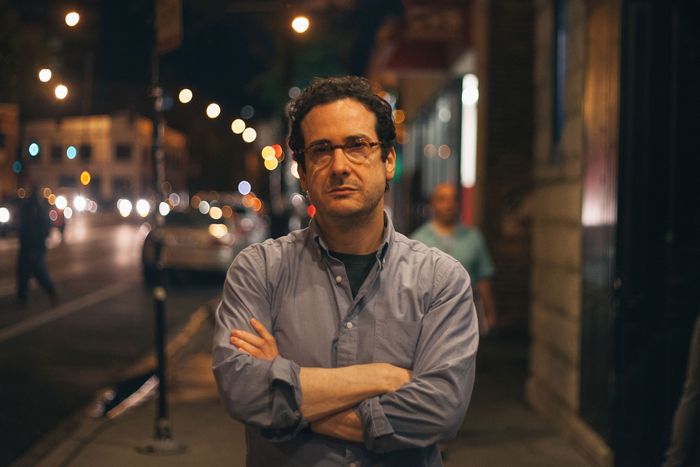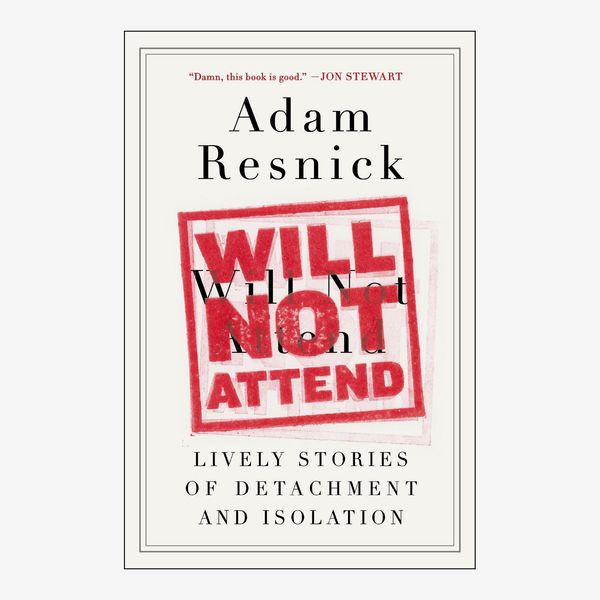
Looking for some quality comedy entertainment to check out? Who better to turn to for under-the-radar comedy recommendations than comedians? In our recurring series “Underrated,” we chat with writers and performers from the comedy world about an unsung comedy moment of their choosing that they think deserves more praise.
Resnick, who’s mostly known for his work on Late Night with David Letterman, Get a Life, and Cabin Boy, takes anecdotes from his childhood, teenage, and adult years and weaves them into stories that, if you didn’t know you were reading a memoir, you might mistake for expertly crafted humorous fiction. From his hatred of Disney World, to chasing his brother with a kitchen knife, to convincing his hot-tempered father to give someone he thinks is his school’s janitor a ride, Resnick compiled a memoir that is too perfect not to revisit seven years later.
Tom Scharpling has been a fan of Resnick for decades, even before he knew the writer’s name. Scharpling, who would go on to write for TV shows like What We Do in the Shadows and Monk and established his own cult fanbase with the long-running comedy-radio show The Best Show, grew up watching Late Night with David Letterman. Scharpling has now released his own memoir, It Never Ends: A Memoir with Nice Memories!, and in reading it, it’s hard not to see some overlap between Scharpling and Resnick, who both attended local community colleges and have a particular disdain for the world. In a recent interview with Vulture, the writer and director cited Will Not Attend as the “funniest memoir he’s ever read” because of not only its humor but also its spirit, strength, and warmth, which he feels all culminate in a very human story. Here’s what else Scharpling had to say about writing a memoir of his own and why Resnick’s book is worth reading.
Was Will Not Attend an influence for you when writing It Never Ends?
Will Not Attend was inspiring to me because it’s just so funny. Whatever story Adam is telling in it, he always kept his voice funny, no matter how rough a story was. So it was definitely an influence in that regard, because that was my goal.
I just want [my book] to be funny first. Even if the stuff I’m talking about is not so much fun, I want to find a way to keep it funny. But I also wanted to not make it so that I was turning my stories into comedy or fodder for people to laugh at. That part was a struggle for me — to just kind of respect myself through the process.
Adam Resnick has such a distinct voice that just echoes throughout his book.
The voice sets the tone. That and keeping it funny are the two biggies. John Waters’s book, Role Models, was also a huge influence because it’s clearly his voice; it’s not him talking into his phone and then somebody else transcribes it. Those are the two that pop up immediately when I think in terms of influence. Because I had never written a book before, I was like, What’s my voice gonna sound like in this thing? What’s that gonna be like for flow? How intrusive am I going to be on my own story?
My worst nightmare would be if somebody thought I was doing some kind of comment on memoirs or something. I’d rather somebody say the book isn’t funny than say, “Oh, your book was so meta and was such a clever comment. It was like a parody of a memoir.” That would be the worst thing you could say. I worked so hard to avoid that.
What was one of your favorite stories from Will Not Attend?
The Booker story is just one of the funniest, most tragic things I’ve ever read. It’s basically him and his brother driving with their dad, who was, like, a hair-trigger-temper guy. And they drive past Adam and his brother’s janitor from school, and they’re like, “Let’s give him a ride.” And the dad gives him a ride. And then the kids realize that that’s not Booker in the car, it’s just some guy. And the way Adam says that he got yelled at once by his father for petting the dog too loud is just … that says everything you need to know about the world he’s in and how his dad is.
You feel like you know him after reading this. You kind of know Adam through his dad in that regard too. His dad seemed like such a tough guy who just stood up and couldn’t take certain things. And then you’re just like, Well, I can see how Adam is who Adam is because of his dad. The way he worked with small things was so impressive to me, to where I decided to write this one chapter [in It Never Ends] about coin pushers and games. And a lot of comedy-writer friends have said that that’s their favorite chapter, because it just was like, “You took this seemingly dull thing — the most dull thing, which are those boardwalk games where you shoot coins at the different platforms and try to get them to fall — and you turned it into a whole world.”
You and Adam are both wonderful at making these comedic connections to life events most of us wouldn’t think are funny. In seeing Adam’s work, do you see those similarities between yourself and him?
Yes, definitely. Neither of us are overeducated. We’re kind of maybe self-educated. We did not have that experience of going to a good school. It’s funny because his work — with Get a Life and the stuff he did with Chris Elliott and his Letterman writing and Cabin Boy — had such a big impact on my life and was such an influence before I knew Adam. And then when I met him and got to know him, I was just like, Oh, the guy behind so much of this stuff is funny in ways that he hasn’t even expressed yet. And then he wrote the book, and then it was like, Oh, well now you see the person, and this is just the funniest person. He’s beleaguered the way I can be called beleaguered.
Mike Sullivan wrote in 2014 that Resnick’s life growing up in Harrisburg, Pennsylvania, was like “living in the scummier real-world equivalent to Tom Scharpling’s Newbridge.”
I could see that. That’s a pretty rough area. And it’s funny that that’s where Adam came from, because it’s not exactly where comedy writers come from. They don’t normally come from the scrappy rough-and-tumble world of fighting and chasing your brother around with a knife. But he lived in a weird world and didn’t know what else to do. And so with The Best Show, we created our own weird world that could be like a catch-all for everything. You can filter all your fears and anxieties into this strange town and kind of represent everything. But Harrisburg is not a fictional town. That’s the difference.
I’m from Long Island, and you’re from New Jersey, places that are stereotypical for breeding a certain kind of loud, obnoxious person. But both places seem to be the origin of a lot of comedians and comedy writers as well.
Absolutely. I think that breeds comedy writers in a certain way that you just are next to the thing. I think there needs to be some sort of “everybody feeling less than” to make comedy, in some regard. Comedy usually isn’t awesome when it comes from people who are superior to everybody, which is kind of why there’s no Fox News [version of] The Daily Show, no matter how hard they try. If you’re implying that you’re better than everybody, nobody’s going to laugh with you. I think you need that lower status of living outside of the fabulousness of Manhattan or the coolness of Brooklyn. You need to just eat some crap living out on the periphery of those places.
I imagine a lot of Best Show listeners are curious about your personal life to some extent. Was there hesitation going so deep into your personal life in this memoir?
Absolutely. You cross a line that you can’t go back from when you write about this stuff. So it’s out there, and it’s the weirdest experiences for these [stories] that I was just perfectly fine not sharing with anybody ever. These memories are like … I’ve let go of them in a way, which is a positive thing in some aspects, but it’s also very scary too. To just be like, Oh, I never shared any of this stuff and now people know all of it. It went from nobody knowing to potentially everybody knowing.
This book was a process, and the act of living with this book will be a process too. I’ll go through it, I guess. I have no choice at this point. And I came very close to that so many times where I was like, This shouldn’t happen. Why am I doing this? There were points where I’d be just like, I could just focus my energy on writing for TV and make a lot more money and be a lot more anonymous, but it was like, No, that’s not the right version of things.
Why should people read Will Not Attend?
Because it’s the single funniest memoir. It’s so incredibly funny, and it just makes me laugh in so many different ways. But there’s such a spirit and strength and warmth to the whole thing that it’s just such a human story. To me it’s like David Sedaris stuff, but with teeth, in a way. Like when Adam goes to Disney World, he’s not observing it; he’s there to fight it. He’s there to do battle with Disney World. He’s seeing everything that’s wrong with it, and he just can’t roll with certain things. And it’s people buying into the things that are driving him nuts. It drives him that much more nuts, like, other family members being so into this. And he’s seeing everything that doesn’t work with it. And it’s just that collision, it’s just the funniest. It’s just the funniest book I’ve ever read.
You admit in your book that you’re more of a people pleaser, while Adam just doesn’t seem to care what people think.
His book is called Will Not Attend. That’s everything you need to know right there. Mine would be called No, of Course I’ll Attend, and I’ll Help Clean Up Afterwards If You Want. That would be my version of Will Not Attend.


